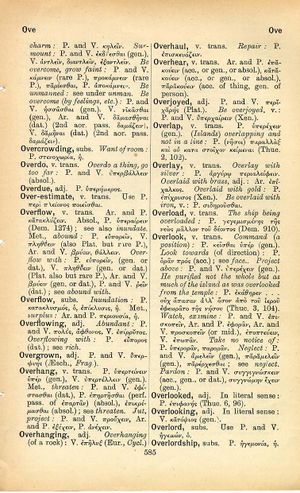overlook: Difference between revisions
Δυσαμένη δὲ κάρηνα βαθυκνήμιδος ἐρίπνης / Δελφικὸν ἄντρον ἔναιε φόβῳ λυσσώδεος Ἰνοῦς (Nonnus, Dionysiaca 9.273f.) → Having descended from the top of a deep-greaved cliff, she dwelt in a cave in Delphi, because of her fear of raving/raging Ino.
(Woodhouse 4) |
(CSV4) |
||
| Line 1: | Line 1: | ||
{{ | {{Woodhouse1 | ||
| | |Text=[[File:woodhouse_585.jpg|thumb|link={{filepath:woodhouse_585.jpg}}]]'''v. trans.''' | ||
<b class="b2">Command</b> (<b class="b2">a position</b>): P. κεῖσθαι [[ὑπέρ]] (gen.). | |||
<b class="b2">Look towards</b> (<b class="b2">of direction</b>): P. ὁρᾶν [[πρός]] (acc.); see [[face]]. | |||
<b class="b2">Project above</b>: P. and V. ὑπερέχειν (gen.). | |||
<b class="b2">He purified not the whole but as much of the island as was overlooked from the temple</b>: P. ἐκάθηρεν . . . οὐχ ἅπασαν ἀλλʼ ὅσον ἀπὸ τοῦ ἱεροῦ ἐφεωρᾶτο τῆς νήσου (Thuc. 3, 104). | |||
<b class="b2">Watch, examine</b>: P. and V. ἐπισκοπεῖν, Ar. and P. ἐφορᾶν, Ar. and V. προσκοπεῖν (or mid.), ἐποπτεύειν, V. ἐπωπᾶν. | |||
<b class="b2">Take no notice of</b>: P. ὑπερορᾶν, παρορᾶν. | |||
<b class="b2">Neglect</b>: P. and V. ἀμελεῖν (gen.), παραμελεῖν (gen.), παρέρχεσθαι; see [[neglect]]. | |||
<b class="b2">Pardon</b>: P. and V. συγγιγνώσκειν (acc., gen., or dat.), συγγνώμην ἔχειν (gen.). | |||
}} | }} | ||
Revision as of 09:48, 21 July 2017
English > Greek (Woodhouse)
v. trans.
Command (a position): P. κεῖσθαι ὑπέρ (gen.). Look towards (of direction): P. ὁρᾶν πρός (acc.); see face. Project above: P. and V. ὑπερέχειν (gen.). He purified not the whole but as much of the island as was overlooked from the temple: P. ἐκάθηρεν . . . οὐχ ἅπασαν ἀλλʼ ὅσον ἀπὸ τοῦ ἱεροῦ ἐφεωρᾶτο τῆς νήσου (Thuc. 3, 104). Watch, examine: P. and V. ἐπισκοπεῖν, Ar. and P. ἐφορᾶν, Ar. and V. προσκοπεῖν (or mid.), ἐποπτεύειν, V. ἐπωπᾶν. Take no notice of: P. ὑπερορᾶν, παρορᾶν. Neglect: P. and V. ἀμελεῖν (gen.), παραμελεῖν (gen.), παρέρχεσθαι; see neglect. Pardon: P. and V. συγγιγνώσκειν (acc., gen., or dat.), συγγνώμην ἔχειν (gen.).

